Fleas and ticks are more than just an annoyance; they are common external parasites that can pose serious health risks to our beloved dogs and cats, ranging from skin irritation and allergic reactions to transmitting dangerous diseases. Ensuring your pet is protected year-round is a fundamental part of responsible pet ownership. With a plethora of options available on the market, understanding the different types of treatments, their active ingredients, and their spectrum of protection is crucial for making an informed decision. This guide, drawing on expert insights and detailed product analysis, aims to help you navigate the choices and select the most effective flea and tick medicine for both your canine and feline companions.
Why Flea and Tick Prevention is Crucial for Both Dogs and Cats
Parasites like fleas and ticks aren’t just uncomfortable for pets; they are vectors for various diseases that can affect both animal and human health. Fleas can cause intense itching, leading to skin infections, and can transmit tapeworms if ingested. They can also lead to flea allergy dermatitis, a severe allergic reaction in sensitive pets. Ticks, on the other hand, are notorious for spreading serious conditions such as Lyme disease, ehrlichiosis, anaplasmosis, and Rocky Mountain spotted fever. Heartworms, transmitted by mosquitoes, can cause severe lung disease, heart failure, and damage to other organs in dogs and cats. Intestinal worms like hookworms and roundworms can lead to malnutrition, gastrointestinal issues, and even stunted growth, particularly in puppies and kittens.
Effective parasite control not only safeguards your pet’s health but also protects your family and home from potential infestations. A single flea can lay up to 50 eggs per day, quickly leading to a home infestation that is difficult to eradicate. Regularly administering the right preventative medicine is an act of care that benefits everyone.
Top Pick for Comprehensive Dog Protection: Simparica Trio Chewable Tablets for Dogs
When it comes to broad-spectrum parasite protection for dogs, Simparica Trio stands out as a top-tier choice. This monthly, prescription-only chewable tablet offers an all-in-one solution for canine companions, tackling a wide array of internal and external parasites with remarkable efficacy. It is specifically formulated for dogs and should not be used for cats.
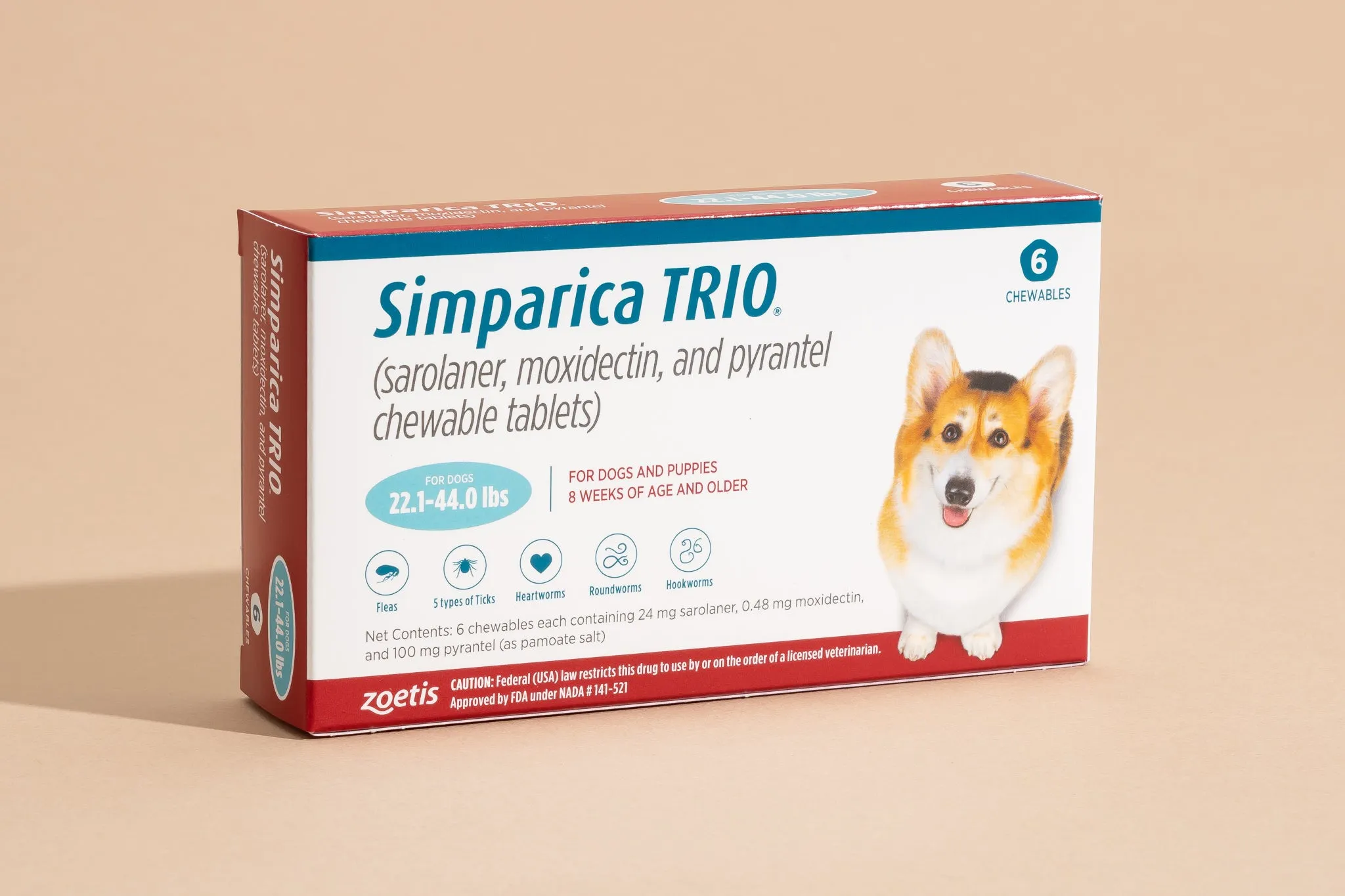 Simparica Trio Chewable Tablets for Dogs packaging for comprehensive flea, tick, and heartworm prevention
Simparica Trio Chewable Tablets for Dogs packaging for comprehensive flea, tick, and heartworm prevention
Simparica Trio provides robust protection against fleas and five types of ticks, including the black-legged tick (deer tick), brown dog tick, American dog tick, lone star tick, and the Gulf Coast tick. The Gulf Coast tick, in particular, has been expanding its geographical reach, making comprehensive protection against it increasingly important. Beyond external parasites, this powerful chewable also prevents heartworm disease and treats infestations of hookworm and roundworm. Its liver-flavored nugget makes administration easy for most dogs, and it can be given with or without food. Simparica Trio is safe for puppies eight weeks and older, weighing at least 2.8 pounds, with specific dosages available for dogs up to 132 pounds. For dogs exceeding this weight, a veterinarian can advise on the correct combination of tablets.
The efficacy of Simparica Trio comes from its unique combination of three active ingredients. Sarolaner, an isoxazoline compound, is responsible for killing fleas and ticks. According to Chris Adolph, a veterinary parasitologist at Zoetis (the manufacturer), sarolaner can help bring home flea infestations under control within four to eight weeks when all pets are treated regularly. The other key ingredients are moxidectin, which offers crucial protection against heartworm disease, and pyrantel, which broadens the spectrum to include adult and immature stages of two species of hookworms and two species of roundworms.
While Simparica Trio offers extensive protection, it is important to note that it is not currently labeled for the Asian longhorned tick. If this specific tick is prevalent in your area, you might consider alternative or complementary treatments. The annual cost for Simparica Trio typically ranges from $350 to $405, depending on the dosage required for your dog’s weight.
Long-Lasting Protection for Dogs: Bravecto Chew for Dogs
For pet owners seeking a less frequent dosing schedule, the Bravecto Chew for Dogs provides exceptional, long-lasting protection against fleas and certain ticks. This oral treatment is unique in its ability to kill fleas and several types of ticks for up to 12 weeks, making it one of the most convenient options available. Like Simparica Trio, Bravecto Chew is exclusively for dogs and should never be administered to cats.
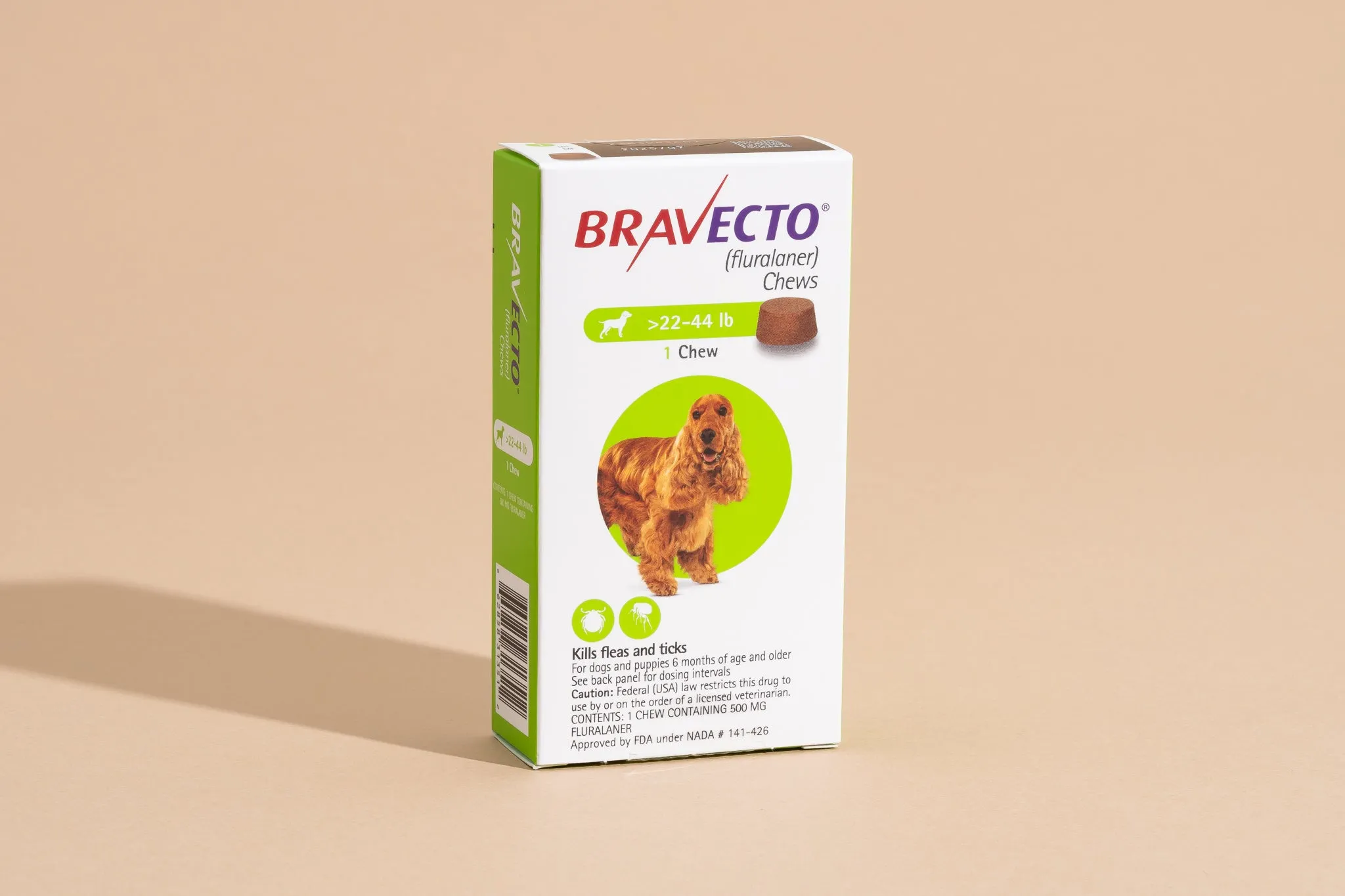 Bravecto Chew for Dogs box, a long-lasting oral flea and tick treatment option
Bravecto Chew for Dogs box, a long-lasting oral flea and tick treatment option
Bravecto’s active ingredient, fluralaner, is also an isoxazoline, effective in controlling existing flea and tick populations on your dog and aiding in resolving home infestations. Importantly, Bravecto is one of the few treatments that specifically targets the Asian longhorned tick, alongside the black-legged tick, brown dog tick, American dog tick, and lone star tick. However, owners in areas with high lone star tick populations should note that for full protection against this specific tick, Bravecto should be administered every eight weeks, rather than the standard 12. This adjusted schedule still offers a significant advantage in terms of convenience compared to monthly treatments.
A key distinction of Bravecto Chew is that it does not provide protection against heartworm or intestinal worms like hookworm and roundworm. If these internal parasites are a concern, a separate deworming or heartworm preventative medication will be necessary. Bravecto Chew is available in various dosages for dogs weighing from 4.4 to 123 pounds, with larger dogs potentially requiring a combination of chews as advised by a vet. It should be given with food to maximize absorption. Bravecto also comes in a topical formulation for dogs who may have dietary sensitivities or aversion to chewable tablets.
The annual cost for Bravecto Chew typically ranges from $330 to $350, based on a 12-week administration schedule and dog’s weight. When considering options, some pet owners might also look into [dog itch medicine](https://dogcarestory.com/dog-itch-medicine/) if their pet frequently suffers from skin irritation from bites, but prevention remains the best defense.
Alternative Approaches: Collars and Topicals for Dogs (and Considerations for Cats)
While oral chewables offer systemic protection, collars and topical spot-on treatments provide alternative methods of flea and tick control. These options can be particularly appealing for their ease of use or for pets with specific needs. However, it’s crucial to understand their spectrum of protection and potential risks, especially when considering a multi-pet household with both dogs and cats.
Budget Pick: Seresto Flea and Tick Collar for Dogs
The Seresto Flea and Tick Collar offers a unique approach to parasite control for dogs by both killing and repelling fleas and ticks. This means parasites don’t need to bite your dog to ingest the active ingredients, potentially reducing the risk of disease transmission. It provides extended protection for up to eight months, making it the longest-lasting preventative option among our recommendations.
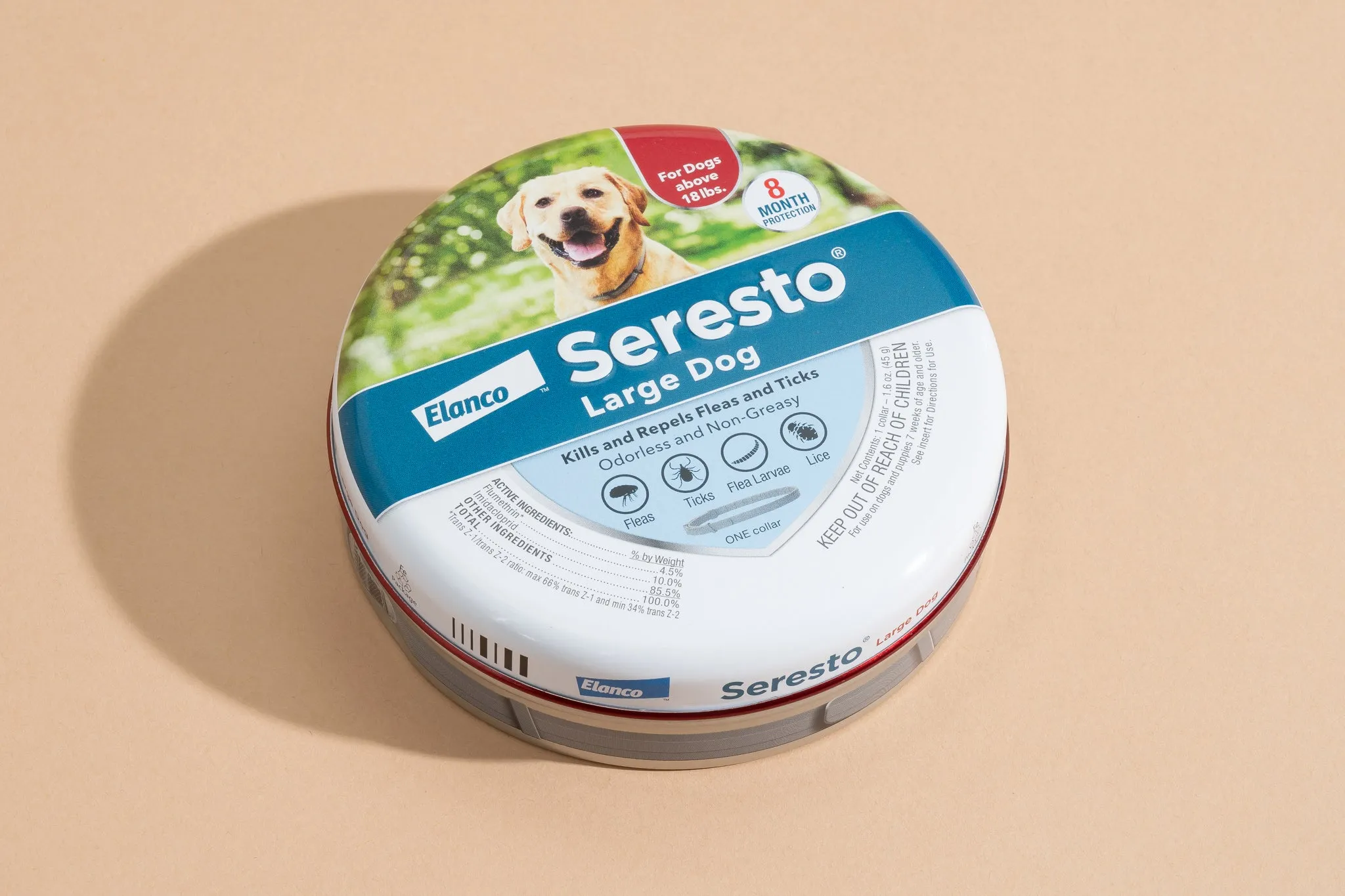 Seresto Flea and Tick Collar for Dogs in a protective tin, offering extended parasite protection
Seresto Flea and Tick Collar for Dogs in a protective tin, offering extended parasite protection
The collar works against fleas, black-legged ticks, brown dog ticks, American dog ticks, lone star ticks, chewing lice, and sarcoptic mange. Its repellant action is particularly beneficial in preventing tick-borne infections that can be transmitted quickly after attachment. Susan Little, a veterinary parasitologist, suggests that many veterinarians recommend using an isoxazoline (like Simparica Trio or Bravecto) as a baseline, and then adding a repellent collar like Seresto if your dog frequently visits tick-heavy areas or during peak tick season. This layering approach can offer enhanced protection.
However, similar to Bravecto, the Seresto collar does not protect against internal parasites such as heartworm, hookworm, or roundworm. Therefore, a separate product would be needed to cover these internal threats. It’s also important to be aware of the safety issues that have been raised concerning the collar’s release mechanism in recent years, prompting careful review by regulatory bodies like the EPA. The collar is available in two sizes: one for small dogs up to 18 pounds and another for “large dogs” over 18 pounds. The annual cost for a Seresto collar is approximately $90.
Budget Pick: K9 Advantix II Flea and Tick Spot Treatment for Dogs
K9 Advantix II is a monthly, over-the-counter topical spot treatment that offers comprehensive external parasite protection for dogs. It not only kills but also repels fleas, ticks, and lice, similar to the Seresto collar, preventing them from needing to bite your dog.
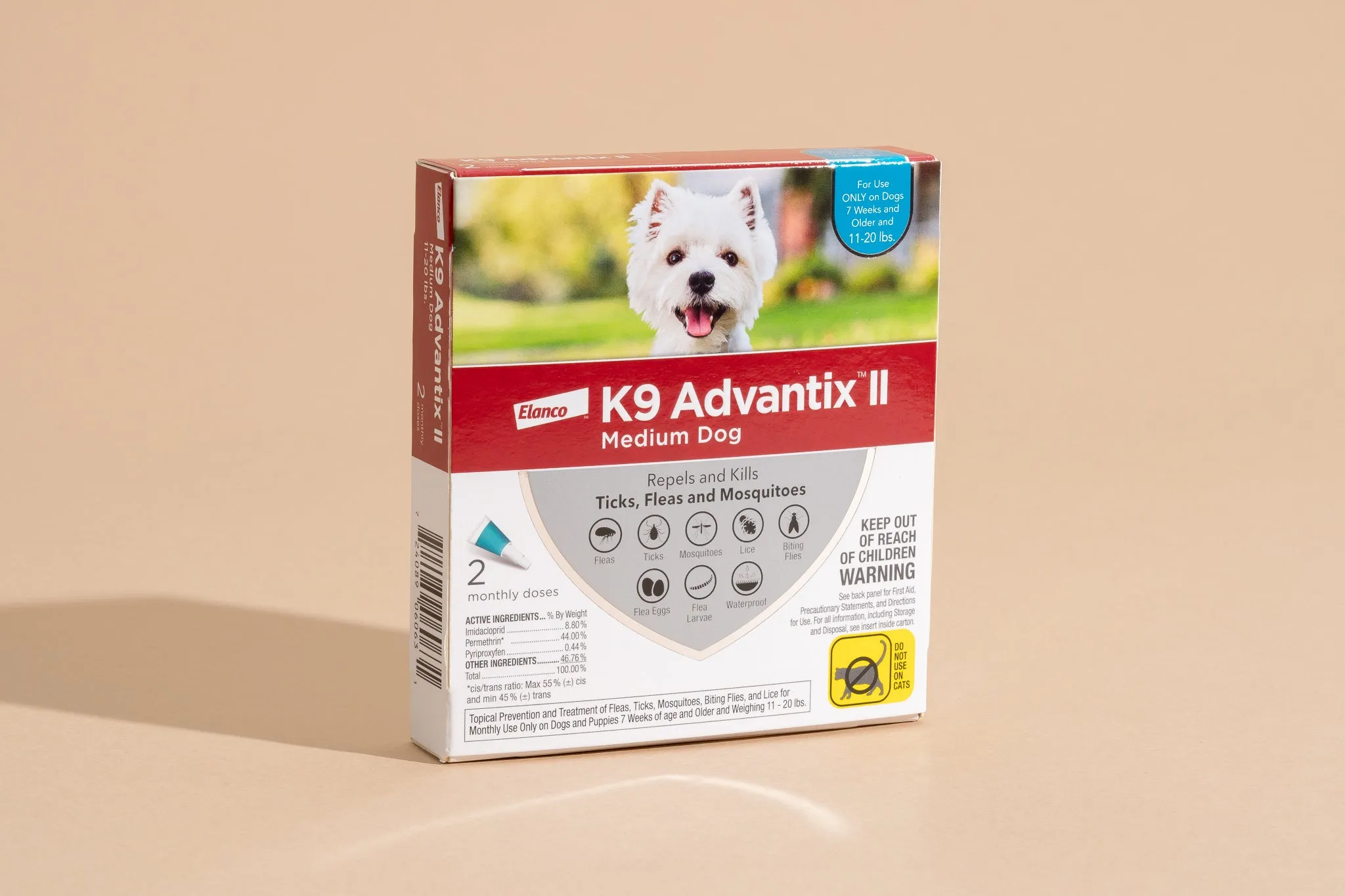 K9 Advantix II Flea and Tick Spot Treatment for Dogs box, a topical repellent also effective against mosquitoes
K9 Advantix II Flea and Tick Spot Treatment for Dogs box, a topical repellent also effective against mosquitoes
A significant advantage of K9 Advantix II is its ability to kill and repel biting flies and mosquitoes. Mosquitoes are the primary vectors for heartworm disease and West Nile virus, so this added protection is valuable. The treatment works on the surface of the skin and hair coat, utilizing active ingredients imidacloprid (effective against fleas since the mid-1990s) and permethrin. The ticks it targets include the black-legged, brown dog, American dog, and lone star ticks.
Crucial Safety Warning for Cat Owners: It is vital to understand that K9 Advantix II contains permethrin, which is highly toxic to cats, even in small concentrations. If you have both dogs and cats in your home, extreme caution must be exercised. The product label explicitly instructs to keep treated dogs separated from cats for at least 24 hours after application to prevent accidental ingestion or contact. Symptoms of permethrin poisoning in cats can be severe and require immediate veterinary attention. This highlights why understanding the specific needs and sensitivities of all your pets is paramount when selecting Flea And Tick Medicine For Dogs And Cats. This treatment does not prevent heartworm or treat intestinal parasites, so separate medications are necessary for those. K9 Advantix II is available in four dosages based on dog weight, with an annual cost of approximately $155.
Flea and Tick Solutions Specifically for Cats
Given the unique physiology of cats and their sensitivity to certain chemicals, particularly permethrin found in many dog products, selecting appropriate flea and tick medicine for cats requires careful attention. It is critical to never use a dog-specific product on a cat.
For cats, popular and effective options include:
- Oral Chewables: Similar to dogs, some oral medications are available for cats, such as Credelio Cat. These are generally given monthly and work systemically to kill fleas and ticks that bite the cat.
- Topical Spot-Ons: Many brands offer cat-specific topical treatments that are applied to the skin at the base of the neck. Examples include Revolution Plus (which also covers ear mites, heartworm, and some intestinal worms), Bravecto Topical Solution for Cats (providing 12-week protection against fleas, ticks, heartworm, and intestinal parasites), and Frontline Plus for Cats. These products contain active ingredients safe for felines.
- Flea Collars: While Seresto also offers a cat-specific collar, similar to the dog version, it provides long-lasting flea and tick protection. Owners must ensure the collar fits properly and does not pose a strangulation risk.
- Shampoos and Sprays: These can offer immediate relief by killing existing fleas and ticks, but they typically do not provide long-term prevention and are best used as part of a broader prevention strategy.
When choosing a product for your cat, always look for formulations specifically labeled “for cats” and consult with your veterinarian. They can recommend the safest and most effective option based on your cat’s age, weight, lifestyle (indoor vs. outdoor), and the prevalence of parasites in your area. If your [dog ate allergy pill](https://dogcarestory.com/dog-ate-allergy-pill/) or other unexpected medications, it highlights the importance of keeping all pet medicines securely stored and correctly labeled to prevent accidental ingestion by the wrong species.
Choosing the Right Flea and Tick Medicine for Your Pet
Selecting the optimal flea and tick medicine for dogs and cats involves considering several key factors:
- Species-Specific Needs: As demonstrated, dog products are often toxic to cats. Always use species-specific medications.
- Parasite Prevalence: Understand which fleas, ticks, and internal parasites are common in your geographical region. Your veterinarian is the best resource for this information.
- Pet’s Lifestyle: An outdoor, adventurous dog will likely need more robust protection than an indoor-only cat.
- Age and Weight: Most medications have specific dosage instructions based on your pet’s age (e.g., puppy/kitten suitability) and weight.
- Health Conditions: Pets with pre-existing conditions, sensitivities, or those on other medications may require specific types of preventatives. Always inform your vet about your pet’s full medical history.
- Ease of Administration: Consider whether an oral chewable, a topical spot-on, or a collar is easiest for you and your pet.
- Budget: While cost is a factor, prioritize efficacy and safety. The annual costs can vary significantly between different types and brands of
flea and tick medicine for dogs and cats. - Comprehensive Protection: Evaluate whether a single product offers sufficient protection or if a combination of treatments (e.g., a flea/tick preventative plus a separate heartworm medication) is necessary. For general health inquiries beyond parasites, such as a
[medicine for dog runny nose](https://dogcarestory.com/medicine-for-dog-runny-nose/), always consult your vet for tailored advice.
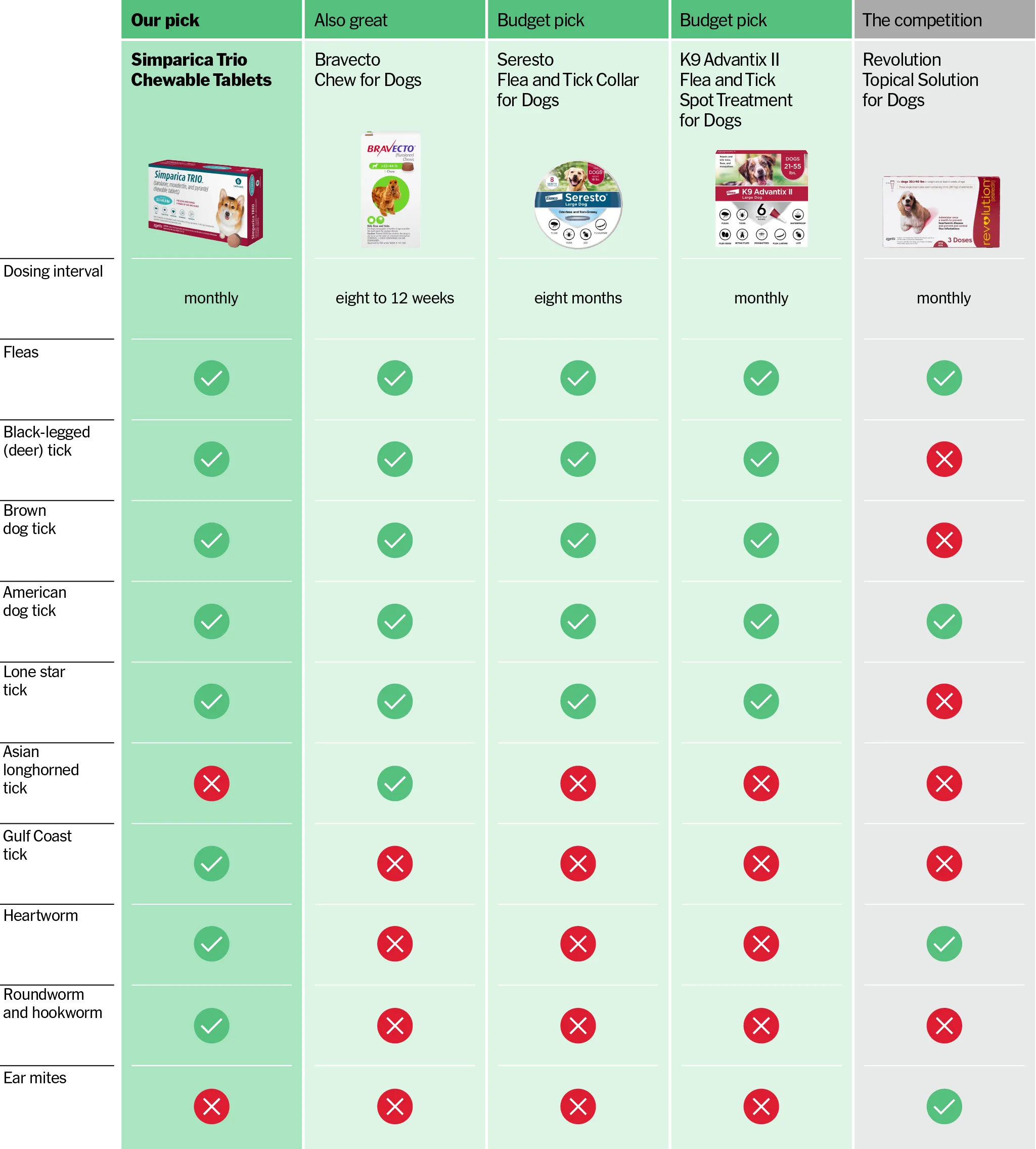 Comparative chart of flea and tick medicine for dogs and the parasites they target
Comparative chart of flea and tick medicine for dogs and the parasites they target
Conclusion
Protecting your dogs and cats from fleas, ticks, heartworms, and intestinal worms is a continuous and vital responsibility. The market offers a diverse range of products, each with its unique benefits, spectrum of protection, and administration method. From the broad-spectrum efficacy of Simparica Trio for dogs to the long-lasting convenience of Bravecto, and the repelling action of Seresto collars and K9 Advantix II topicals (with critical warnings for cat safety), there’s a solution for nearly every pet and lifestyle. For your feline friends, remember to always choose cat-specific formulas to ensure their safety and well-being. The key to effective parasite control lies in informed decision-making and regular communication with your veterinarian. They can provide personalized recommendations, ensuring your beloved companions receive the most appropriate and safest preventative care to live healthy, happy lives free from parasitic threats.
References
- Adolph, C. (Veterinary Parasitologist, Zoetis). Personal communication.
- Companion Animal Parasite Council (CAPCVET). (n.d.). Gulf Coast Tick [Video]. Retrieved from https://capcvet.org/videos/gulf-coast-tick/
- Centers for Disease Control and Prevention (CDC). (n.d.). Gulf Coast Tick. Retrieved from https://www.cdc.gov/ticks/maps/gulf_coast_tick.pdf
- Centers for Disease Control and Prevention (CDC). (n.d.). Lone Star Tick. Retrieved from https://www.cdc.gov/ticks/maps/lone_star_tick.pdf
- Centers for Disease Control and Prevention (CDC). (n.d.). Lyme Disease Causes. Retrieved from https://www.cdc.gov/lyme/causes/?CDC_AAref_Val=https://www.cdc.gov/lyme/transmission/index.html
- Little, S. (Veterinary Parasitologist). Personal communication.
- Merck Animal Health USA. (n.d.). Bravecto Chew for Dogs. Retrieved from https://www.merck-animal-health-usa.com/bravecto/chew-for-dogs
- National Pesticide Information Center (NPIC). (n.d.). Imidacloprid General Fact Sheet. Retrieved from http://npic.orst.edu/factsheets/imidagen.html
- PetMD. (n.d.). Pyrantel Pamoate. Retrieved from https://www.petmd.com/pet-medication/pyrantel-pamoate
- Springer. (2021). Moxidectin: A broad-spectrum endectocide for companion animals. Retrieved from https://link.springer.com/article/10.1186/s13071-021-05104-7
- U.S. Environmental Protection Agency (EPA). (n.d.). Seresto Pet Collar Review. Retrieved from https://www.epa.gov/pets/seresto-pet-collar-review
- Wirecutter, The New York Times. (Various). Reviews and product information for flea and tick treatments. (Implicitly cited through product links and general structure).
